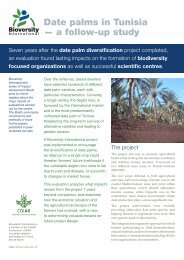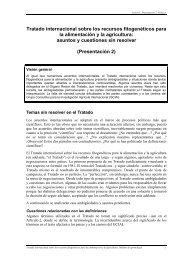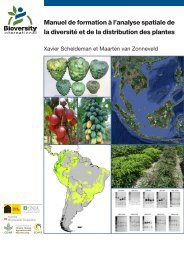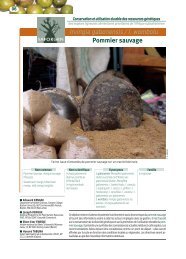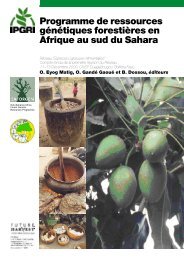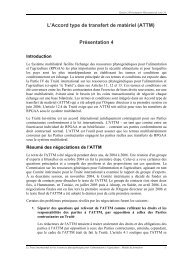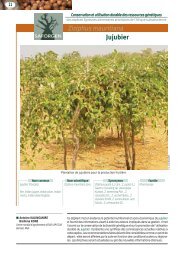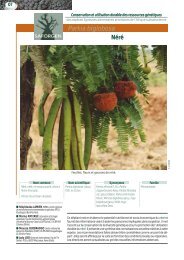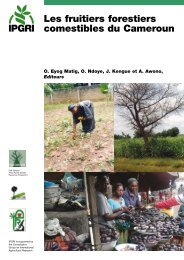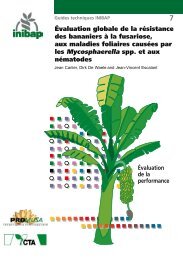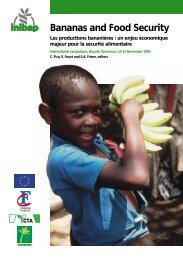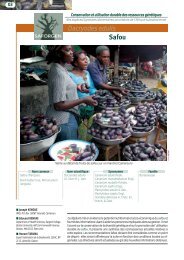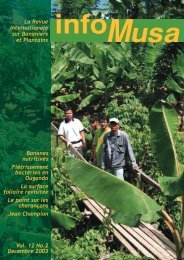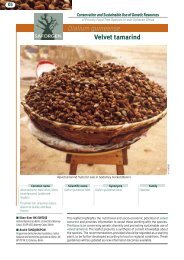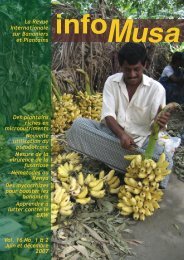Rocket: a Mediterranean crop for the world - Bioversity International
Rocket: a Mediterranean crop for the world - Bioversity International
Rocket: a Mediterranean crop for the world - Bioversity International
Create successful ePaper yourself
Turn your PDF publications into a flip-book with our unique Google optimized e-Paper software.
10<br />
ROCKET GENETIC RESOURCES NETWORK<br />
material that is not yet fully mature. This means that <strong>the</strong> maturation will<br />
occur after collecting. One system that has been tried at IdG is collecting a lot<br />
of stalks and putting <strong>the</strong>m into big paper bags to allow natural desiccation.<br />
After a few days, mature silique will open and <strong>the</strong> seeds will accumulate in<br />
<strong>the</strong> bag. One can get a high seed yield in this way, and even though <strong>the</strong><br />
germination is lower, <strong>the</strong> numbers compensate <strong>for</strong> this deficiency.<br />
• Oily seeds. There are reports in <strong>the</strong> literature that oily seeds are less easily<br />
stored and much care has to be taken with <strong>the</strong>ir desiccation and storage. At<br />
IdG, we have little experience on this subject and <strong>the</strong>re<strong>for</strong>e more in<strong>for</strong>mation<br />
from seed physiologists should be sought on how to best preserve <strong>the</strong>m.<br />
• Capsules opening at maturity. The influence of this point on seed<br />
germination has been discussed earlier. It is important to stress now that <strong>for</strong><br />
multiplication purposes <strong>the</strong> dehiscence of fruits poses ano<strong>the</strong>r question: <strong>the</strong><br />
material near maturity needs daily inspection and careful collecting in order<br />
to minimize seed loss. In insulated conditions this implies a lot of labour<br />
with an increased cost. This point is of some importance, especially <strong>for</strong><br />
genebanks which plan large-scale multiplications and have allocated few<br />
funds to rocket and o<strong>the</strong>r underutilized species.<br />
• Possibility of contamination with local pollen. As just stated, <strong>the</strong> necessity<br />
to open <strong>the</strong> isolation cages <strong>for</strong> plant care may allow <strong>the</strong> entrance of <strong>for</strong>eign<br />
pollen into <strong>the</strong> isolation space, especially in those areas where rocket grows<br />
spontaneously near <strong>the</strong> multiplication field. This implies that <strong>the</strong> allocation<br />
of <strong>the</strong> multiplication facility has to be chosen very carefully, possibly<br />
exploring in previous years those areas less infested by wild rocket. The<br />
irony is that, in this case, germplasmists always looking <strong>for</strong> rocket need to<br />
find ways in which to get rid of it!<br />
• Possibility of increasing self-incompatibility. During multiplication in<br />
insulation it has been noticed that <strong>the</strong> level of self-compatibility of <strong>the</strong>se<br />
species reported as strictly allogamous is ra<strong>the</strong>r high. Never<strong>the</strong>less, in <strong>the</strong><br />
next generations problems might arise owing to inbreeding depression or to<br />
<strong>the</strong> build-up of an incompatibility system. Many allogamous species have<br />
internal genetic mechanisms limiting <strong>the</strong>ir possibility of selfing over a long<br />
period. Un<strong>for</strong>tunately, both Eruca and Diplotaxis have not been sufficiently<br />
studied from this point of view. The issue is, however, not a minor one since<br />
it has importance when one needs to select commercial varieties of rocket. In<br />
this case <strong>the</strong> possibility of breeding a true variety is linked with <strong>the</strong><br />
possibility of maintaining <strong>the</strong> stocks in purity throughout selfing. O<strong>the</strong>rwise<br />
one needs to choose alternative strategies such as maintenance of artificial<br />
populations through appropriate mixtures of genotypes. It seems to me that<br />
this point should receive much more attention by geneticists and plant<br />
breeders.<br />
Questions <strong>for</strong> <strong>the</strong> future<br />
The last 2 years have been very productive <strong>for</strong> <strong>the</strong> <strong>Rocket</strong> Network, and this success<br />
allows some optimism <strong>for</strong> <strong>the</strong> future. Never<strong>the</strong>less some points have to be brought<br />
to <strong>the</strong> attention of <strong>the</strong> participants of this workshop. The first is <strong>the</strong> minor funding<br />
of this activity. It is essential that all Network participants be proactive in finding<br />
some ad hoc financial support <strong>for</strong> <strong>the</strong> Network; o<strong>the</strong>rwise, <strong>the</strong> risk is that after a first<br />
phase of voluntary enthusiasm, this activity will cease. Even a little funding could<br />
increase <strong>the</strong> commitment of Network members.



